STDC Tamil Nadu - Best Practice of Training the Health Volunteers to End TB in Tamil Nadu
STDC Tamil Nadu - Best Practice of Training the Health Volunteers to End TB in Tamil Nadu

Introduction
The National Tuberculosis Elimination Programme (NTEP) is dedicated to intensifying endeavors to end Tuberculosis in India. It provides comprehensive TB care services, fully aligned with the objectives outlined in the National Strategic Plan spanning from 2017 to 2025.1 Training Health Volunteers is essential in addressing misconceptions, effectively engage community, and increase community involvement in the fight against TB.2 The NTEP has created the ‘course for Health volunteers and Treatment supporters on NTEP’ through Modernize Training System (MTS).
Problem
Tamil Nadu Has identified Women Health Volunteers who are helping in the fight against Tuberculosis (TB).3 Their contributions include identifying TB cases, directing individuals suspected of having TB for testing, offering assistance in treatment to patients, and managing adherence to treatment plans. Additionally, they actively contribute to combating stigma and discrimination faced by TB patients within the community. They also play crucial role in all other health programs and activities including HIV and other health activities under primary health care.4
Reaching to a large number of health volunteers in short span of time for training is difficult and Also, Health volunteers need to be taught in their regional language and in a culturally appropriate manner. Evidence suggests that training program in Tamil for TB health volunteers is instrumental in fostering effective communication, community engagement, cultural sensitivity, and overall program success in Tamil Nadu.
1.RNTCP. National Strategic Plan for tuberculosis elimination. 2017
2.Government of Tamil Nadu. Tamil Nadu State Health Policy Vision 2030 “A promise towards Right to Health.” 2022
3.Knowledge base NTEP. Trainers Guide: Course for Health Volunteers on NTEP | Knowledge Base [Internet]. 2022 [cited 2024 Jan 16]. Available from: https://ntep.in/node/3557/revisions/12956/view
4. National TB Elimination Program. Tamil Nadu-National Tb Elimination Program Tamil Nadu-National TB Elimination Program Best Practices followed during the COVID 19 Pandemic. 2021.
Intervention & Methods followed for translating the standardized curriculum into Tamil
Intervention & Methods followed for translating the standardized curriculum into TamilIntervention:
Tamil Nadu state has decided to translate the NTEP approved ‘Course for Health volunteers and Treatment supporters on NTEP’ and train all the health volunteers using the modernized training system.
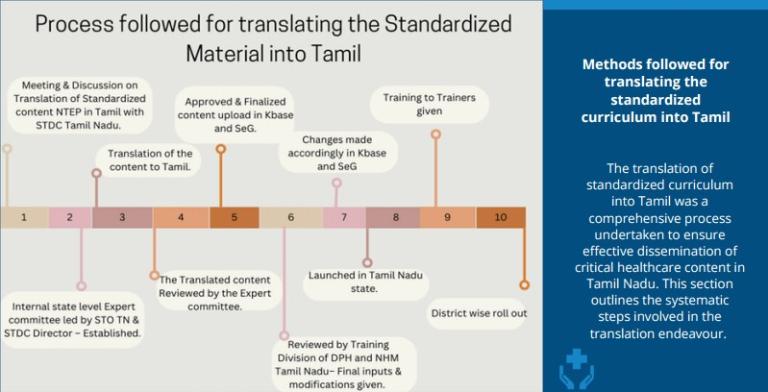
Figure 1: process followed for Translating the standardized Material into Tamil and Implementation strategy at the State and District level
Methods followed for translating the standardized curriculum into Tamil:
The translation of standardized curriculum into Tamil was a comprehensive process undertaken to ensure effective dissemination of critical healthcare content in Tamil Nadu. This section outlines the systematic steps involved in the translation endeavour.
| 1.Initial meeting and discussion | 2.Expert Committee Formation | 3.Translation of Content |
|
State TB Cell and STDC (State TB Training and Demonstration Centre) Tamil Nadu conducted the initial meeting and discussion involving key stakeholders to plan the translation process. Image

|
Established a state-level Expert Committee chaired by the State Tuberculosis Officer (STO) of Tamil Nadu and the Director of State TB Training and Demonstration Centre (STDC) to oversee the translation process, ensuring linguistic accuracy and cultural relevance. Committee included 8 other representatives who know programme very well and are fluent in Tamil Image

|
The Training curriculum was translated into Tamil by a team led State IEC officer. The translated contents were submitted on a timely basis to the expert committee for the review and feedback. The question bank for pre-test and post test questions attached to each chapter were also translated. Image

|
| 4.Expert Committee Review and Feedback Integration | 5.Configuration of training curriculum on Knowledge Base | 6.Review by the State Training division |
|
Expert committee members read the entire content together in physical mode and provided feedbacks on timely basis. The content creation team incorporated the suggestions and resubmitted it for approval. The expert committee had a total of 5 in-person meeting and one virtual meeting to finalize the content. Image

|
After approval, the final version of the translated content was configured into the Knowledge Base (Kbase). Home | Knowledge Base (ntep.in). NTEP Knowledge base is the subsystem of the modernized training system is the machinery to develop translatable multi-media training material. Image

|
The Training Division of the Department of Public Health (DPH) and the National Health Mission (NHM) in Tamil Nadu conducted a detailed review of the content focusing on cultural appropriateness and any potential conflicts with state norms. Image

|
7.Launch of the Course for Health Volunteers and Treatment supporters in Tamil Nadu :
The Modernized Training System for health volunteers was officially inaugurated in Tamil Nadu on March 13, 2023. The launch event, presided over by the Honourable Director of Public Health and Preventive Medicine DPH, marked a significant milestone in healthcare training initiatives.
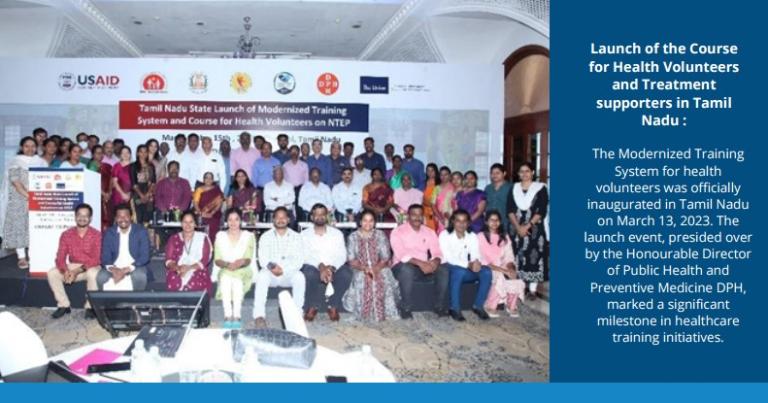
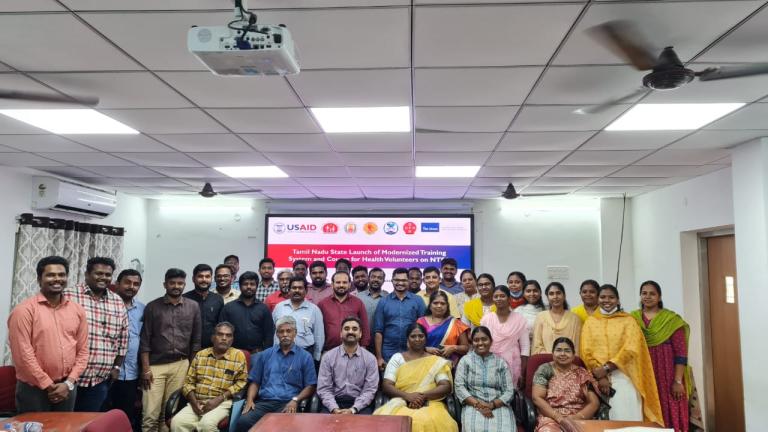
8.Training of Trainers:
With the help of DTO, 2 Senior Women Health Volunteers and 1 DTTMO (District Training Medical Officer) from every district of Tamil Nadu were identified as Trainers. Entire pool of trainers were divided into two batches and 6 Hours ToT was conducted in two batches at state level on March 14th and 15th 2023.
9.District-Wise Roll-Out:
People to be trained were identified district wise, Training batches were created and scheduled through Learning Management System (WHO Swasth-E-Gurukkul) .In Phase -1, 5 districts have conducted trainings for Women Health Volunteers
Early Outcome: Training was conducted in several district, including Chennai, Coimbatore, Vellore, Villupuram, and Cuddalore. Across these locations, trainees consistently demonstrated improvement in their post-test scores compared to their pre-test scores. The total number of trainees attended were 454.
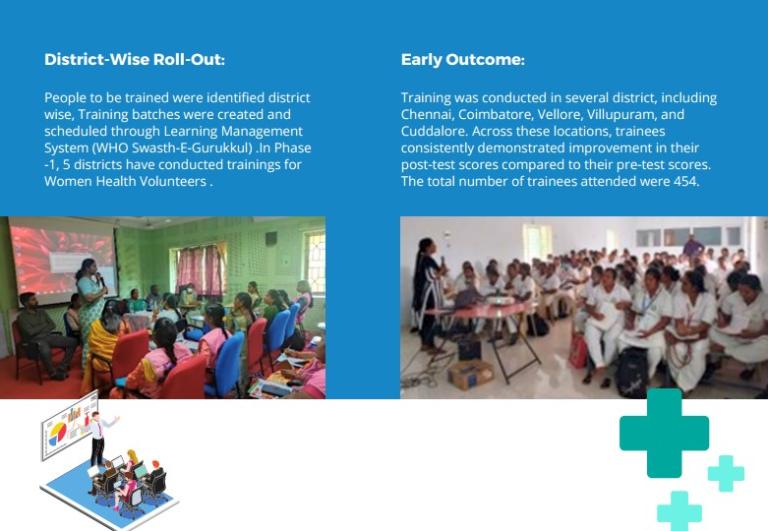
Details of training conducted for Women Health Volunteers
Details of training conducted for Women Health VolunteersTable 1 shows the number of Women Health Volunteers who successfully completed the course with the translated curriculum and the measures of change in pre-test and post test scores before administration of learning modules.
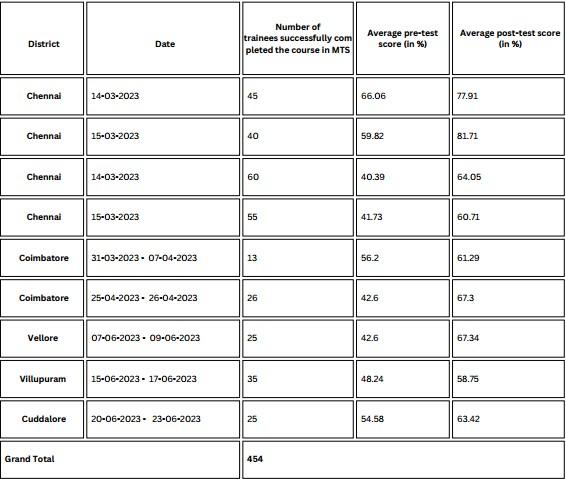

Conclusion
Conclusion
|
Image

|
STDC Tamil Nadu has demonstrated a system for translating the contents into regional language, which is replicable. Involvement of State Training Division, State Public Health Department and National Health Mission has ensured ownership from all the stakeholders. The meticulous execution of training using translated materials with adequate linguistic and cultural inclusivity, ensured that the health volunteers were able to obtain new learning and skills which are instrumental to their roles in TB prevention and care. Conducting the course in Tamil ensures that vital information is effectively communicated to the target audience. Experience from phase-1 has shown that it is feasible to train the health volunteer through modernize training system, This may help to reach out more number of health volunteers within short span of time. The "Tamil Nadu-Experience of Using the Modernized Training System for Training Health Volunteers" is a transformative initiative poised to make a lasting impact on TB prevention and care in the state. By combining cutting-edge technology with cultural sensitivity, this experience sets a benchmark for training of Health volunteers. |